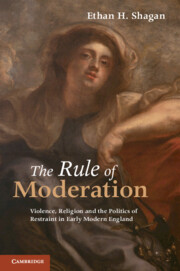3 - Conformist moderation
from Part II - Moderate churches
Published online by Cambridge University Press: 05 June 2012
Summary
The via media and the moderation of the Church
In the half-century following the Elizabethan religious settlement of 1559, influential defenders of the Church of England came to imagine that settlement as a via media in the Reformation and argued that strict adherence to its ordinances was constitutive of religious moderation. This is not to say that they imagined an alternative ‘Anglican’ branch of Christianity between Catholics and Protestants; that vision would not emerge until the nineteenth century. Rather, their via media lay in a straightforwardly Protestant Church between on one side Roman Catholics and on the other side puritans, whose unrestrained calls for further Reformation seemed to threaten the disorder of continental Anabaptism. These early opponents of puritanism, who systematically developed earlier, Henrician ideas of the Church of England as a via media, are known to historians as ‘conformists’, a scholarly term of art recognising their preference for obedience to the Church by-law-established as the basis for an orderly Christian society.
Historians have studied Elizabethan and early Stuart conformists, especially the most famous of them, Richard Hooker, from a variety of perspectives, and we now understand a great deal about their debts to the European Reformed tradition, their relationship to later ‘Anglican’ thought, their polemical engagement with puritanism and other important issues. Yet no one has thought to ask just what the conformists meant by moderation. Since Catholicism and puritanism appear to be near opposite ends of a normative Christian spectrum – from dogmatism to individualism, from outward worship to inward spirituality, from centralisation to fragmentation – it has seemed self-evident that a middle space between them actually existed and that contemporaries would try to claim it. If, however, for early modern thinkers moderation implied not merely peace but governance, and the golden mean was not merely a point on a spectrum but a condition of authority, then conformist moderation may have meant something considerably different than historians have assumed. The purpose of this chapter is thus to demonstrate that the self-proclaimed moderation of the Church of England in its ethical, internal sense – a restrained and reasonable Church rather than an unbridled and fanatical one, a Church virtuously limited in its Reformation and thus a via media between Roman Catholicism and the Radical Reformation – was utterly dependent upon the Church of England's external moderation of its subjects through state power and coercive restraint.
- Type
- Chapter
- Information
- The Rule of ModerationViolence, Religion and the Politics of Restraint in Early Modern England, pp. 111 - 148Publisher: Cambridge University PressPrint publication year: 2011

